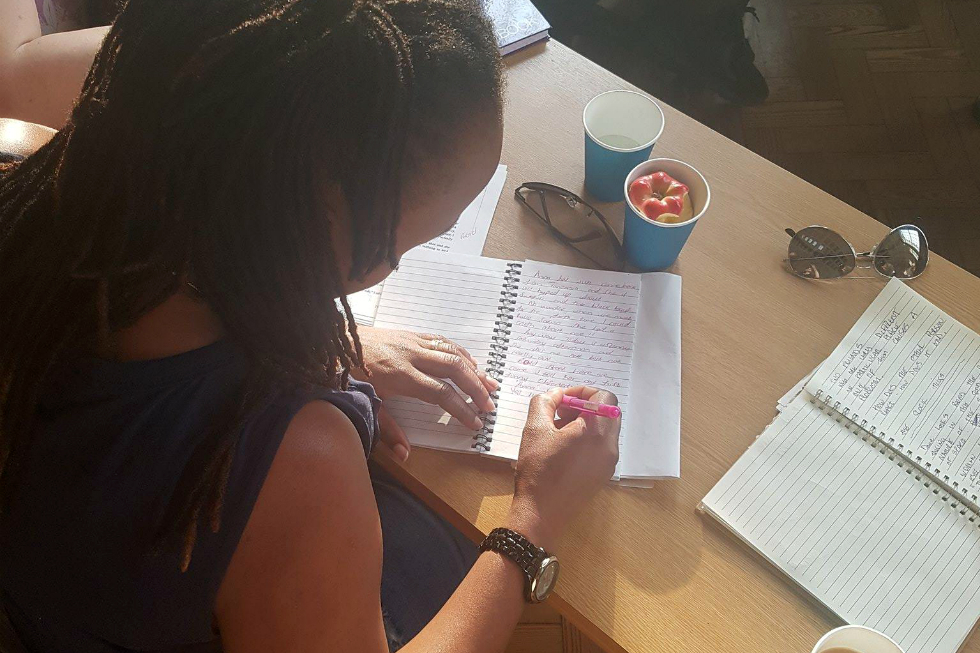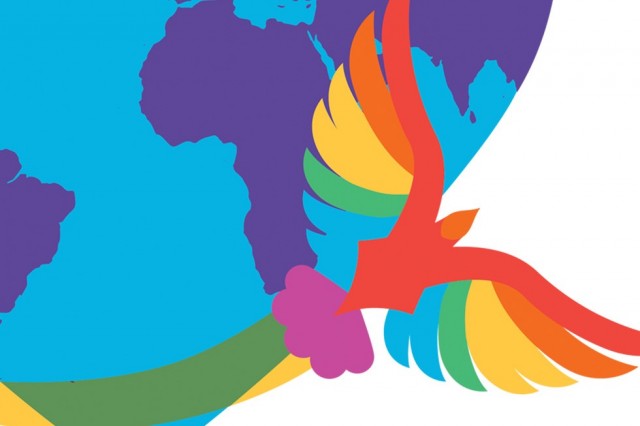“Nothing will stop me”: International LGBTQ+ Writers Share Their Stories

Andrew Wright speaks to the authors of What’s Your World Pride Story?: an anthology of real-life accounts by writers from across the globe, about love and solidarity, but also extreme violence, rejection, and imprisonment…
American playwright and actor Harvey Fierstein once said: “Never be bullied into silence. Never allow yourself to be made a victim. Accept no one’s definition of your life; define yourself.” I was thinking very carefully about this quote before I interviewed a small group of writers recently at Toxteth Library in Liverpool. The international authors of new anthology What’s Your World Pride Story?, their personal memories, essays and poems reference diverse experiences: of family rifts, extreme violence, even slavery. They are funny, heart-breaking, terrifying; written by experienced writers and those emerging, from Ireland to Cameroon. All are, however, part of the LGBTQ+ community, and have come together to share the book at this year’s Liverpool Pride festival.
Before reading any further, it’s worth remembering that homosexuality is still illegal in 72 countries, and punishable by the death penalty in eight. These stories, some of which are written by LGBTQ+ asylum seekers, document harrowing brutalities suffered. Vulnerable to judgements made by others – government officials, neighbours, family, and wider society – it was impossible at times not to be “bullied into silence.” Sometimes, their lives depended on silence.
Which makes the book even more special. Commissioned by Liverpool Pride, and written during a 12-week course ran by Writing on the Wall (WoW) and poet Helen Sandler, everyone’s excited about the book launch this Saturday with live readings, to be held on Pride’s Garden Stage.
One of those authors reading live will be Chaldrine Ekobe, who was born in Cameroon, Central Africa, and fled to the UK to escape imprisonment in his country for his sexuality. He describes in A New Life how “today this gay man is in a place where he is welcomed, treated with love and shown respect.”
Conversely, in My Journey, Namayesa tells how in their home country on the African continent that they were violently threatened: “they would slit my throat with a sharp, two-edged knife”. However, fleeing to the UK wasn’t as safe as they thought. Namayesa was taken advantage of by “people who deceived me, staying for a year inside their house without outside contact, because they told me that black people were not allowed outside.”
From speaking with the What’s Your World Pride Story? authors, it becomes apparent that they have found empowerment through writing. These are stories of endurance from people from all walks of life, some of whom have suffered horrifically and inexplicably. Undoubtedly, transferring such experiences from memory to print was extremely difficult; however, the group tell me that they were bolstered by a genuine community of trust fostered over the book’s development.
“It wasn’t just a safe space; there was a real strength of acceptance”, explains Imogen Christie. “Everyone came in, said: ‘What are you about?’, ‘That’s cool’, ‘What are you about?’, ‘That’s cool, too.’ The diversity of the stories really reflected the diversity of the group… There was a real collective bond.”
Christie was born in Glasgow in the early 1960s, and their contribution, The Boy in the Mirror, is told with a self-effacing charm:
“You know that reflection when you have not a scrap of make-up on and your sweat tash has sideburns to match, as big as mutton chops? It is the girl though who looks back at me, it is the girl who could only be the girl she is through the experience of being the boy she once was.”

With three university degrees, Christie was still surprised at the emotional response their writing invoked. “The journey for me was really emotional, unexpectedly so. I thought I would be quite methodical with my writing, having written loads of essays. But by the time I wrote the last line, there were just tears rolling down my face. It was hugely alien to me. I’m still struggling with the emotions now. But it’s quite joyful.”
Trisha Mckeon, who has written short stories in the past, wrote Brides of Christ about returning to her native Ireland and the rift she experienced with her mother. It awakens in the reader the pain of being shunned, as well as a palpable sense of place:
“And I had returned and here I am, still not knowing what to do, looking out to sea for answers.”
This idea of belonging reflects Mckeon’s time spent working on What’s Your World Pride Story?. She talks of how her confidence increased and inspiration grew from listening to other people’s histories. “It’s funny for me, it’s almost like I didn’t have a struggle”, she says. “I’m in a group of people who have gone through some real shit in their lives. I’ve been through some shit, but not to the same degree. I did feel like what I wrote wasn’t necessarily a traumatic experience, but more a reflection. I write short stories quite a bit and find that what you write is always a reflection of yourself.”
But Mckeon, who tells me how the diversity and dynamics between the authors helped her own creative process, writes with such raw emotion to leave the reader in little doubt of the very real “shit” she went through when wrestling with her conscience over her falling out with her mother:
“The softness of those memories is tainted by the cruel words that were spoken, years later.”
It is indicative of the support network that Mckeon is looking forward to telling her story at Saturday’s book launch not with trepidation, but with excitement and pride.
The same can be said for Rodrick Kazembe, who states that without the backing of WoW and other organisations, such as LGBTQ+ asylum/refugee support group Many Hands One Heart, it would have been difficult to open up and relay his story. “It was a good experience”, he says. “The groups have helped my confidence, I’ve met people in similar situations to me, and feel they are non-judgmental. [What’s Your World Pride Story?] has given me the courage to express myself through writing.”
His hard-hitting prose and powerful use of imagery in poem Nobody Seems to Understand Me belies the notion that Kazembe is a first-time writer – “My mouth hunts you, with fear I appear, nothing will stop me” – and his command and execution of language makes a mockery of the fact he is not speaking in his native tongue – “Constant rumination just exacerbates it, to the extent that I can barely narrate it.”
What’s Your World Pride Story? not only celebrates diversity and individuality, but it is also a testimony to the merits of storytelling. A supportive, safe environment can be conducive to producing the most personally charged, emotive written work possible. But above all, the book is a piece of activism, a manifesto for freedom of expression and hopefully a precursor for change – a sentiment that is echoed by Christie.
“If one person picks that book up”, they tell me, “and it has some effect on them, or it stops them and makes them think, then that’s cool by me. Someone will be moved, someone will be changed, someone will take a step back. That will definitely happen.”
Andrew Wright
See What’s Your World Pride Story? Release & Book Launch at The Garden Stage, Liverpool Pride, 1.40pm—2.10pm and 2.50pm—3.20pm on Saturday 29 July 2017 — FREE
See live music, musicals, film screenings, art exhibitions and more at Liverpool Pride: International Love this weekend, Saturday 29 and Sunday 30 July 2017, at venues across the city — see here for full programme of (mostly free) events





